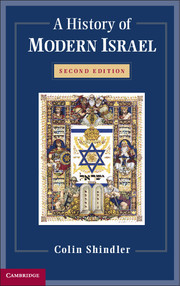Book contents
- Frontmatter
- Contents
- Illustrations
- Maps
- Acknowledgements
- Glossaries
- Chronology
- Preface to the second edition: Towards 2020
- Introduction
- 1 Zionism and security
- 2 The Hebrew Republic
- 3 New immigrants and first elections
- 4 The politics of piety
- 5 Retaliation or self-restraint
- 6 The Rise of The Right
- 7 The Road to Beirut
- 8 Dissent at Home and Abroad
- 9 An insurrection before a handshake
- 10 The end of ideology?
- 11 The Killing of a Prime Minister
- 12 The Magician and the Bulldozer
- 13 ‘He does not stop at the red light’
- 14 An unlikely grandfather
- 15 A Brotherly Conflict
- 16 Bialik's bequest?
- 17 Stagnation and Isolationism
- 18 An Arab Spring and an Israeli winter?
- Bibliography
- Index
- References
3 - New immigrants and first elections
Published online by Cambridge University Press: 05 March 2013
- Frontmatter
- Contents
- Illustrations
- Maps
- Acknowledgements
- Glossaries
- Chronology
- Preface to the second edition: Towards 2020
- Introduction
- 1 Zionism and security
- 2 The Hebrew Republic
- 3 New immigrants and first elections
- 4 The politics of piety
- 5 Retaliation or self-restraint
- 6 The Rise of The Right
- 7 The Road to Beirut
- 8 Dissent at Home and Abroad
- 9 An insurrection before a handshake
- 10 The end of ideology?
- 11 The Killing of a Prime Minister
- 12 The Magician and the Bulldozer
- 13 ‘He does not stop at the red light’
- 14 An unlikely grandfather
- 15 A Brotherly Conflict
- 16 Bialik's bequest?
- 17 Stagnation and Isolationism
- 18 An Arab Spring and an Israeli winter?
- Bibliography
- Index
- References
Summary
The Survivors
Following the collapse of the Nazi regime, several hundred thousand displaced Jews inhabited Europe's DP camps. Prime Minister Atlee had rejected President Truman's request to allow 100,000 to immigrate in the autumn of 1945. Their experience in occupied Europe, however, defined and accentuated their Jewishness. One survivor, Samuel Gringauz, wrote in 1947:
The DPs are the surviving remnant of those Jews who, regardless of origin, culture, social position, ideology, class, yes even religion, were condemned to death only because they were Jewish. American and Swiss citizens, heroes of the First World War, the most respected representatives of European culture, manual labourers and bankers, Zionists and Socialists, Orthodox Jews and Catholics, all were collectively stripped of every attribute and, nameless and non-descript, were tortured and killed – as ‘Jew X’. A Jewish tailor from Rhodes who could find no one in the camp to understand him and a Hungarian druggist baptised thirty years before, lay in the same wooden bunk with me, and died because they were Jewish. This is why the surviving remnant feels itself to be the embodiment of the unity of the Jewish experience. This is why they feel themselves prophets of a national rebirth, charged with the task of symbolising this unity and this rebirth, and of being the backbone of its realization. The belief in these extraordinary tasks intensifies the group consciousness of the surviving remnant and makes it see itself as a ‘chosen group’ within the ‘chosen people’.
Diaspora Jews united around this surviving remnant. Even those who had escaped through the good fortune of distance understood that now all Jews were survivors. Jacob Trobe, the first Jewish Joint Distribution Committee representative to arrive in Bergen-Belsen, estimated that 80 per cent of the camp's Jews wished to leave for Palestine. Ben-Gurion had been the first Zionist leader to visit the DP camps in October 1945. He recorded in his diary that since the liberation of Bergen-Belsen, two thirds of the camp Jews, over 30,000, had died of typhus and tuberculosis. He naturally encouraged Jews to emigrate to Palestine and painted Zionism as the very antithesis to Diaspora subservience. Addressing 800 Jews in a converted monastery, he said:
Hitler was not far from Palestine. There could have been terrible destruction there, but what happened in Poland could not happen in Palestine. They would not have slaughtered us in synagogues. Every boy and every girl would have shot at every German soldier.
- Type
- Chapter
- Information
- A History of Modern Israel , pp. 54 - 77Publisher: Cambridge University PressPrint publication year: 2013



